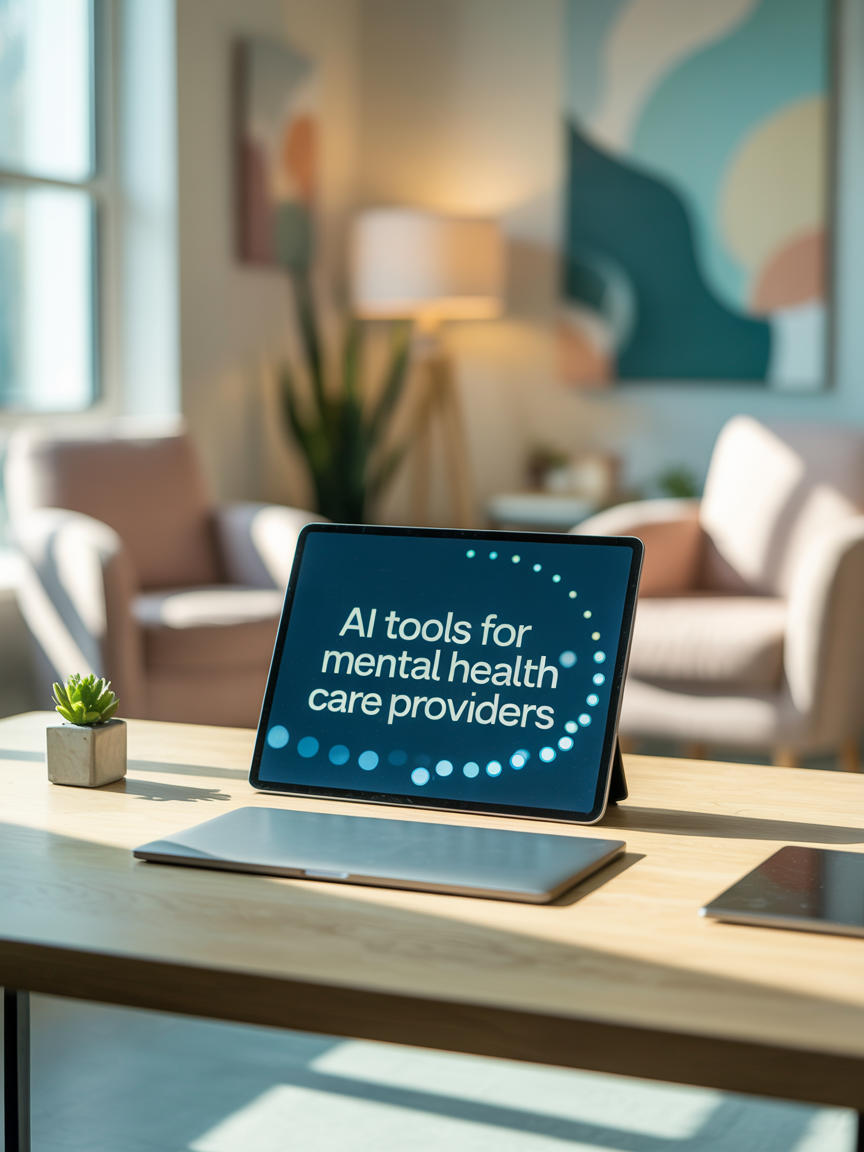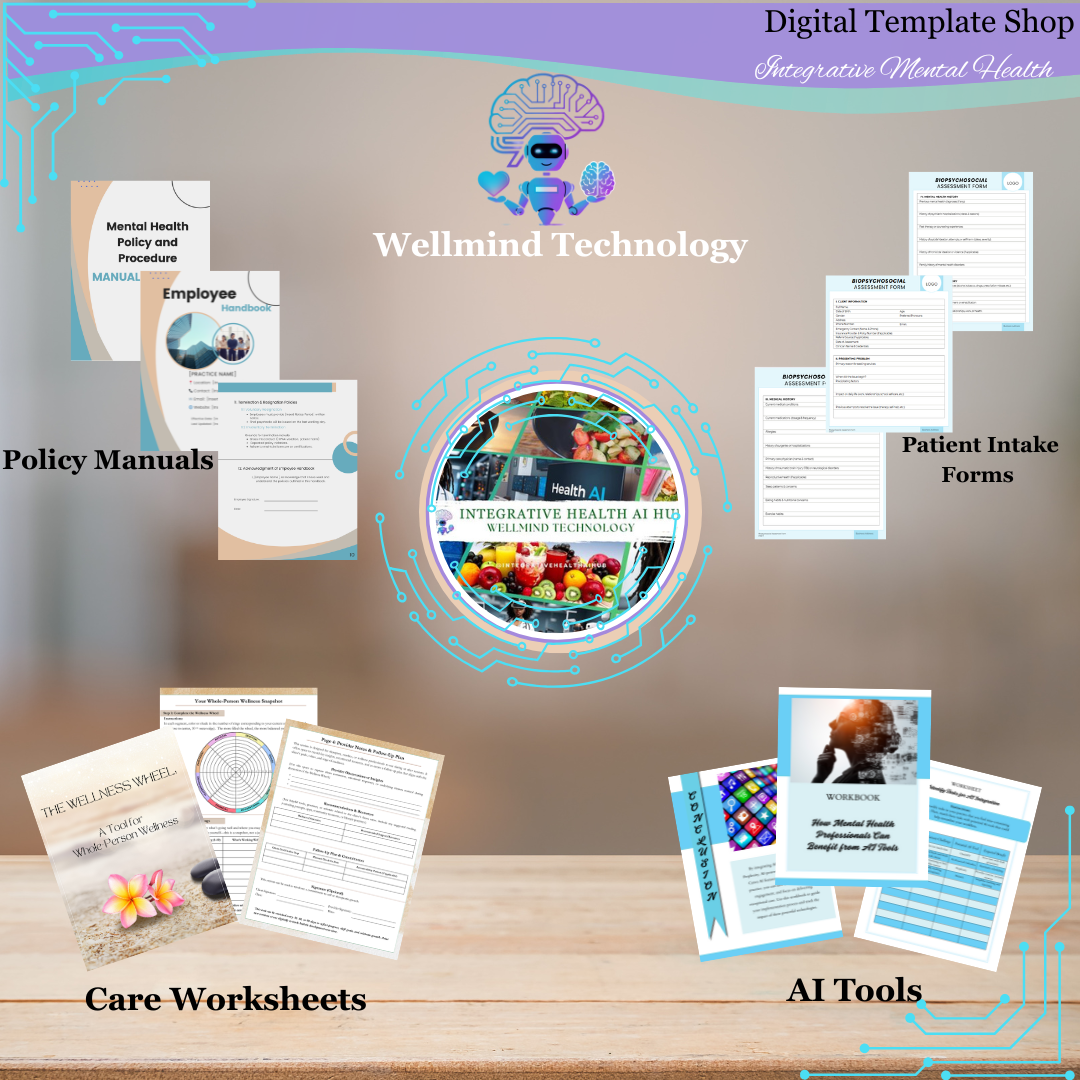How AI Tools are Transforming Private Practice
Private practice is a calling, but it can also feel like a constant juggling act. Between clinical care, admin overload, and trying to keep up with the latest innovations, it’s no wonder so many providers feel stretched thin. But what if I told you that artificial intelligence (AI) isn’t just another buzzword—it’s a strategic solution to some of our most persistent pain points?
As a provider committed to integrative mental health care, I believe technology should enhance our humanity, not replace it. That’s why I’m so passionate about AI: it’s a tool to streamline patient care, prevent burnout, and free us to focus on what we do best—healing.
How AI Tools Can Help
Here’s the reality: one in five adults in the U.S. experiences a mental health issue each year. Meanwhile, providers are drowning in documentation, billing, scheduling, and the pressure to keep up with demand. It’s unsustainable—and unnecessary.
AI is stepping in with real solutions: automating routine tasks, enhancing clinical decision-making, and making care more accessible and personalized. The goal isn’t to replace therapists—it’s to support them in building practices that are both sustainable and scalable.
The Real Possibilities of Implementing AI in Mental Health
Imagine reducing your documentation time by 70%, or having a 24/7 chatbot that offers triage and support between sessions. These aren’t future fantasies—they’re happening now.
Let’s break it down:
| AI Application | Benefit | Impact |
| Automated Documentation | 70% reduction in paperwork time | More face-to-face time with clients |
| Predictive Analytics | 63-92% accuracy in symptom detection | Earlier intervention and improved outcomes |
| AI Chatbots | 24/7 client support | Increased access and engagement |
Here are a few tools I recommend to my clients and colleagues in private practice:
1. Chat GPT is an AI-powered conversation and Content Creation tool
This AI tool can draft emails, summarize session notes, generate blog ideas, and even create templates for client communication. It uses natural language processing (NLP) to understand prompts and produce human-like text, making it a perfect assistant for busy professionals.
How It Helps Mental Health Professionals:
- Efficient Client Communication: Generate follow-up emails or appointment reminders in seconds.
- Session Summaries: Transform your session notes into clear, actionable summaries.
- Content Marketing: Quickly draft blog posts, social media captions, or newsletter content to boost your online presence.
Example: A counselor uses ChatGPT to draft a personalized email reminder for a client:
“Hi [Client Name], I hope this message finds you well. Just a quick reminder of our upcoming session on [Date] at [Time]. Let me know if you have any questions. Looking forward to seeing you!”
2. Perplexity: AI-Powered Research Assistant
What is Perplexity? Perplexity is an AI tool designed to provide concise, accurate answers to complex queries by searching and summarizing credible sources. It’s perfect for mental health professionals who rely on evidence-based practices.
How It Helps Mental Health Professionals:
- Quick Research: Save time researching treatment modalities or client resources.
- Stay Updated: Access the latest studies and trends in mental health.
- Educational Materials: Develop reliable, research-backed resources for clients.
Example: A psychologist uses Perplexity to find the latest cognitive-behavioral therapy (CBT) research for treating anxiety. The tool provides a summary of peer-reviewed articles, saving hours of manual research.
3. AI-Powered Calendars: Simplifying Scheduling
What are AI-Powered Calendars? AI-powered calendars, like Motion or Calendly, are designed to automate scheduling tasks, time-blocking, and appointment reminders. They integrate seamlessly into your workflow, saving time and reducing no-shows.
How It Helps Mental Health Professionals:
- Automated Scheduling: Clients can book appointments without back-and-forth communication.
- Time Management: Block time for sessions, admin work, and self-care.
- Reduce No-Shows: Automatic reminders ensure clients remember their appointments.
Example: A PMHNP uses an AI-powered calendar to allow clients to book sessions online. The calendar syncs with their availability and sends reminders to clients 24 hours before each session.
4. Numeri: Financial AI for Mental Health Practices
What is Numeri? Numeri is an AI-powered financial management tool tailored for small businesses, including private mental health practices. It simplifies tracking income, expenses, and profitability.
How It Helps Mental Health Professionals:
- Automated Invoices: Generate and send invoices without manual effort.
- Expense Tracking: Categorize expenses to understand where your money is going.
- Financial Insights: Access clear, actionable reports to improve profitability.
Example: A practice owner uses Numeri to automate monthly invoicing and track revenue trends, discovering that evening sessions are their most profitable time slots.
5. Canva AI Features: Professional Design Made Simple
What is Canva AI? Canva is a design platform that simplifies creating graphics, presentations, and documents. Its AI features allow for automated layout suggestions, text generation, and image enhancements.
How It Helps Mental Health Professionals:
- Marketing Materials: Create eye-catching social media posts, infographics, and ads.
- Client Resources: Design therapy worksheets, handouts, and presentations.
- Time-Saving Features: Use AI-generated templates and suggestions to speed up the process.
Example: A therapist uses Canva AI to create a branded infographic on stress management techniques for social media, increasing engagement and attracting new clients.
Beyond Admin: Enhancing Patient Care Ethically and Effectively
AI isn’t just about automation—it’s about amplification. Used wisely, it helps identify at-risk clients, personalize treatment plans, and support engagement between sessions. But with great tech comes great responsibility.
If you’re using AI in your practice, here are a few ethical best practices:
- Use only HIPAA-compliant platforms.
- Practice ongoing, informed consent.
- Implement encryption and data anonymization.
- Align with frameworks like the EU AI Act and Responsible AI principles.
Transparency builds trust. As providers, our commitment to data protection is just as important as our clinical expertise.
I Know There is Uncertainty in AI, But You’re Not Being Replaced—You’re Being Resourced
Done right, AI isn’t just efficient—it’s profitable. Studies show that practices that implement AI tools see:
- Up to 90% less time spent on note-writing
- 30% reduction in no-shows
- 31% increase in session volume
- Significant savings on transcription and admin costs
AI allows you to grow with intention, not hustle. It helps you build a business model that’s sustainable, client-centered, and aligned with your calling.
The future of integrative mental health care will be built by providers who lead with both heart and strategy. AI gives us a way to serve more clients, more effectively, without sacrificing our well-being in the process.
Remember: You are more powerful than you realize. Let AI handle the repetitive tasks so you can focus on your mission.
Want to see exactly how I implement these tools in private practice?
Grab my free AI Tool Workbook for Mental Health Professionals—a curated resource to help you confidently integrate AI into your workflow, ethically and efficiently.









Leave a Reply